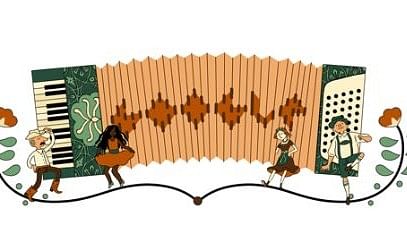
Screengrab of the Google Doodle showing a Accordion artwork.
Credit: Google
The Google Doodle on May 23 celebrates the day the accordion was patented, an instrument that came out of Germany and which Google playfully referred to as a folk musician's 'main squeeze'.
The artwork on the landing search page of Google on Thursday morning depicts dancers decked in German outfits with the accordion playing in the background as one can also read the letters 'G O O G L E' contracting and expanding as the Doodle moves.
Cyrill Demian, an Armenian piano maker is credited with inventing the accordion.
The name accordion is derived from the German word "Physharmonikaz” - a compound word that comes from the Greed words 'Physa' meaning bellows, and 'Harmonikos' meaning harmonic. An accordion has three parts - the right-hand keyboard for the melody, the bellows, and the left-hand keyboard (or buttons) for the accompaniment. This music console is operated by air pressure and belongs to the family of aerophones.
Demian who made a living as a piano maker in Austria's Vienna sought recognition for the world's first accordion on May 6, 1829. Days later, on May 23, 1829— Demian's musical instrument was granted the patent officially.
However, many musicians and researchers also credit C. Friedrich L. Buschmann, whose handäoline was patented in Berlin in 1822. Demian's accordion was a modification of the handäoline, comprising a small manual bellows and five keys.
Demian's patent application is said to have described the instrument as what we now call a push-pull accordion. It produced a different note on each key depending on whether the bellows were pushed or pulled. Five keys would give a few notes more than an octave in a diatonic scale and major chords would be easy to produce.
While at first, accordions were made with buttons on one side, each producing a full chord, the German console evolved to generate two different chords depending on whether the bellows were pushed or pulled.
As musicians across countries developed a taste for this instrument after knowing about it, the accordion arrived in Italy and the rest of Europe, and then other parts of the world.
With time, the making of this music console transformed into featuring both— buttons and a piano keyboard; however, air still plays a crucial role in the rhythm delivered after an accordion is played.
Today, the accordion thrives across genres including Latino polka, tango, folk music, and cajun music, serving as a staple at Oktoberfest, renowned for its carnivalesque atmosphere, music, and traditional attire like dirndls and lederhosens.